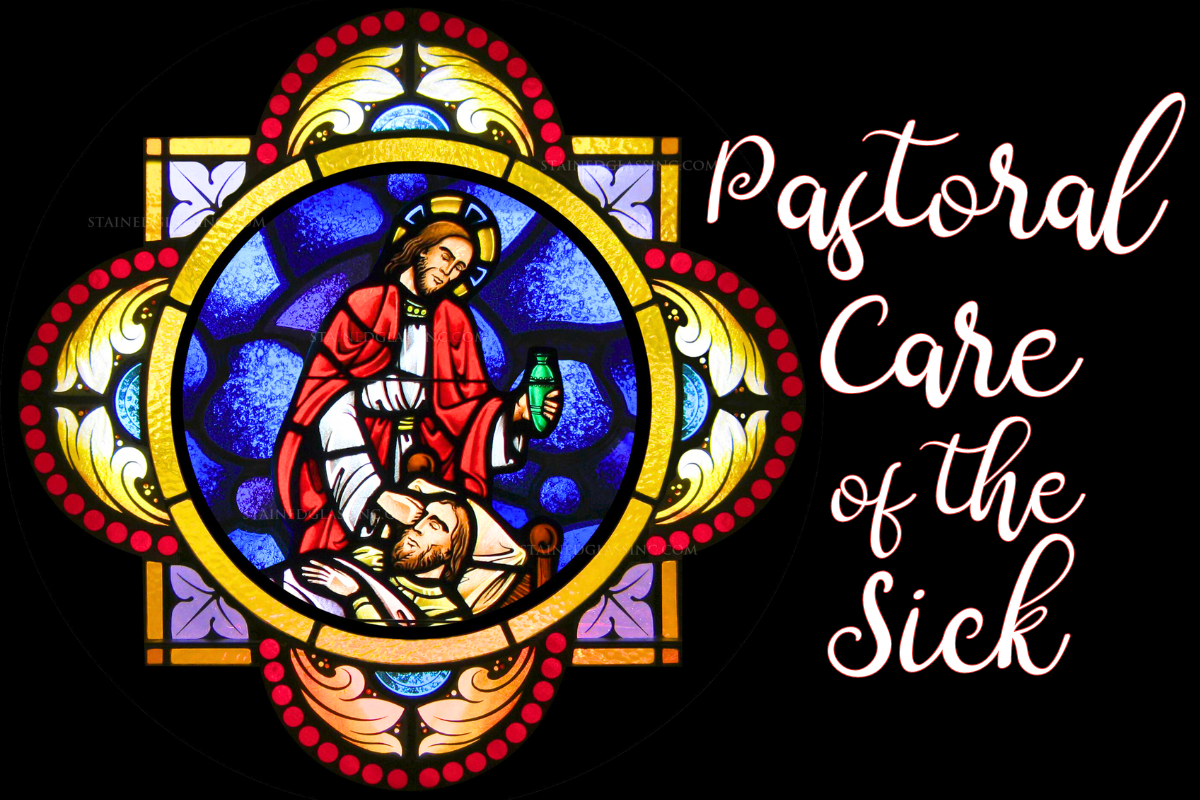Pastoral care of the sick, our topic this month, coincides with the Pope Francis’ prayer intention for July. He reminds us that this service is not exclusively the responsibility of designated clergy, but rather an invitation that Christ presents to all of his disciples. He notes that “The ministry of consolation is a task for every baptized person, mindful of the word of Jesus: ‘I was sick and you visited me’ (Matthew 25:36).”
Jesus teaches us to see his face in those who are sick (Matthew 25:39-40) and to spare nothing to care for the stranger (Luke 10:29-37). Having encountered him ourselves, we bear witness to others who desperately need the assurance of his love and the hope of his promises. Through our charity, our concern, our faith, and our prayers, we become instruments of grace as we provide Christ’s support to the sick and the dying in their hour of need. Whether we introduce them to Jesus or affirm their existing beliefs, we can inspire those who suffer to open their hearts to the Lord and seek reconciliation if necessary. Pope Saint John Paul II asks us to “Proclaim that Christ is the comfort of all who are in distress or difficulty; he is the strength of those experiencing moments of fatigue and vulnerability.”
Pastoral care of the sick becomes transformative when it is elevated by the power of God through sacramental care. The Catechism of the Catholic Church teaches us: “The Lord Jesus Christ, physician of our souls and bodies, who forgave the sins of the paralytic and restored him to bodily health, has willed that his Church continue, in the power of the Holy Spirit, his work of healing and salvation, even among her own members. This is the purpose of the two sacraments of healing: the sacrament of Penance and the sacrament of Anointing of the Sick” (CCC 1421). Our Divine Physician remains physically present in the Eucharist, providing the unwell with nourishment for their bodies and souls. When the infirm cooperate with sacramental grace, “The Spirit heals and transforms those who receive him by conforming them to the Son of God” (CCC 1129).
Saint Paul encourages us to view our struggles as we view Jesus on the cross. Only through the suffering and human death of Jesus is the glory of his resurrected life revealed. “Therefore, we are not discouraged; rather, although our outer self is wasting away, our inner self is being renewed day by day. For this momentary light affliction is producing for us an eternal weight of glory beyond all comparison, as we look not to what is seen but to what is unseen; for what is seen is transitory, but what is unseen is eternal” (2 Corinthians 4:16-18).
Before we share in the Resurrection, we are called to share in the Passion. Whether we like it or not, we are all subjected to illness and death as a consequence of Original Sin. Because of God’s love for us, death does not have to be the end (John 3:16), and suffering does not have to be in vain. Uniting our trials with Jesus enables us to participate in the redemption of the world. Our example is love; our hope is in the Lord; our future is with God.
Pope Saint John Paul II remarks that “suffering, which is present under so many different forms in our human world, is also present in order to unleash love in the human person.” He adds that “The world of human suffering unceasingly calls for, so to speak, another world: the world of human love.” Pope Francis states that “the first form of care needed in any illness is compassionate and loving closeness. To care for the sick thus means above all to care for their relationships, all of them: with God, with others–family members, friends, health care workers–with creation and with themselves.”
Caring for others is an expression of our love for neighbor, a human privilege, and a path toward sanctification. Pope Francis says: “Time spent with the sick is holy time. It is a way of praising God who conforms us to the image of his Son, who ‘came not to be served but to serve, and to give his life as a ransom for many’ (Matthew 20:28).”
Be sure to visit our “Weekly Challenge” section this month for some important insights regarding pastoral care of the sick. And feel free to comment on how giving or receiving care helps you grow in faith.



